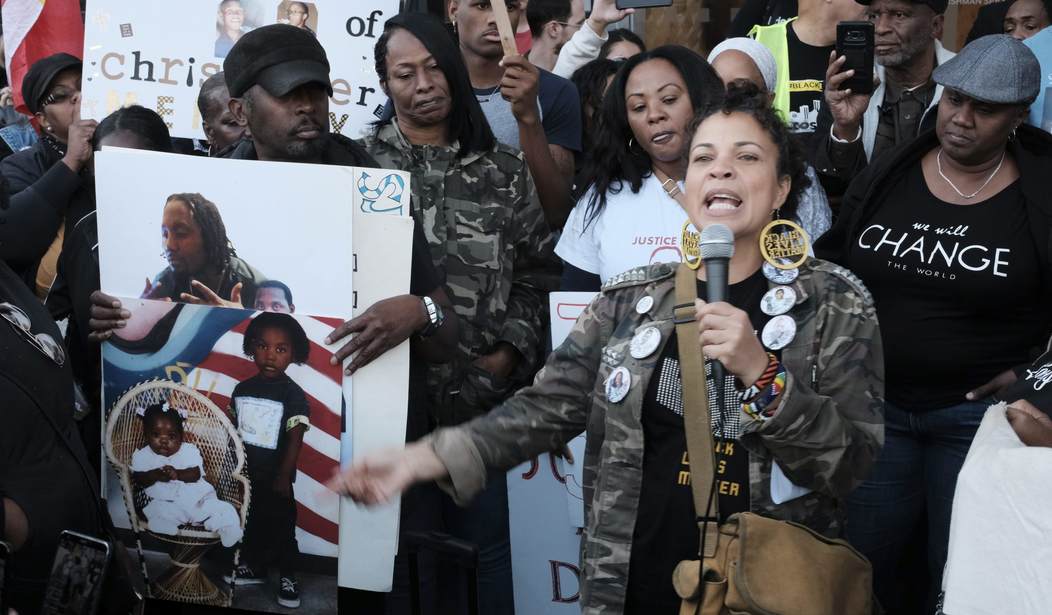WASHINGTON – Melina Abdullah, co-founder of Black Lives Matter Los Angeles, said Black Lives Matter activists have a “right to riot” to make powerful people listen to their message and explained why she would not appear on stage for a panel discussion with a police officer.
Abdullah said that “those who already hold power” are trying to dictate how activists should protest certain issues.
“They’re demanding that we demand our rights in fairness and justice in particular ways. So they have their own politically correct kind of mantra that they’re offering. They’re saying that we’re wrong when we get on the freeway and make cars slow down, right? They’re saying that we’re wrong to yell,” Abdullah said during a Washington Post Live discussion about political correctness in America.
“I’m thinking about the work that I do on Black Lives Matter and we work very closely with families of those who have been killed by police. They’re even censoring the way that black people mourn and saying things like, ‘You have no right to yell. Just vote someone else in.’ That’s still a demand for political correctness, but in the wrong way – the absolute wrong way,” she added.
Abdullah argued that riots are a way to make leaders pay attention.
“Because they don’t want to hear us, right? The people who have to yell, right? What is it? A riot is the language of the unheard, right? We have a right to riot because you’re not hearing us when we speak in the way that you dictated that we need to speak,” she said.
Abdullah, professor and chair of Pan-African Studies at California State University Los Angeles, explained why she refuses to “engage with people” who she believes “hate” her, such as supporters of President Trump.
“If you hate me, go hate me somewhere else. I wonder why, because especially after this last presidential election there was a lot of conversation, especially toward us in the activist community who were most in the streets – what are we going to do to win the people who voted for the current president over to our side? And there was conversation about that, and how are we going to reach out to them,” she said.
“And my thing is, I’m not. I’m not. You are a white supremacist. You go over there. And I’m over here. There is no – I don’t want to reach out to you. I know what you think of me, and if you have your own personal coming to Jesus or Allah or whatever moment and it changes you, good, go through that process, but I don’t want to be part of it,” she added.
Abdullah continued, “I’m just saying that there’s a lot of white supremacists who don’t identify as white supremacists, but their behavior is absolutely white supremacy, which makes them a white supremacist. So I don’t need them to affirm it for me – I know.”
Dylan Marron, host of the podcast Conversations with People Who Hate Me, described his view on reaching out to people on the opposite side of political issues.
“Not to comment on my guests, but I do think that systems of white supremacy are upheld by people who don’t know that they’re upholding them. That, I think, is fair to say. Again, not speaking for my guests,” he said.
“We should just be speaking to the people that disagree with us, we should be speaking to the people who hate us, we should be speaking to the people who oppose us. I also am very clear in my podcast that I don’t see it, nor do I see what I’m doing, as a prescription for activism,” he said. “I am not saying put down the protest sign and pick up the phone and the world will be a better place.”
When asked whether she would appear with members of law enforcement onstage to discuss policing and race issues, Abdullah replied, “I would not.”
She said a discussion around “reimagining public safety” should occur without the presence of police.
“I believe that when we talk about how to build a world where we can all live and walk freely, for me, and I think for many others, that’s an absence of police. Being someone who’s studied the origins of policing, especially in this country, and understanding that the roots of policing are in chattel slavery, and that the origins of policing are in paddy rollers, and they’ve been trained to see me and other black people with targets on our backs, my goal is not to make kinder slave catchers,” she said.
“What I’d rather do is spend time with people who are serious about engaging in radical imagination, and saying ‘what does freedom look like,’ and building toward that,” she added.
Abdullah said police officers should be trained for some other kind of work.
“We don’t need people roaming through our streets with guns and badges and really seizing upon us, descending upon especially black, brown, and poor communities, and then having a goal of locking us up in cages. So I don’t want to sit on a panel with law enforcement. They can all get other jobs. I live for the day when that is gone and they can all be retrained for something else,” she said. “I don’t need to engage in some kind of activist version of bungee jumping. So I don’t need to sit on a stage with a cop, with a white supremacist, with a, you know, heterosexist.”
Alicia Garza, co-founder of Black Lives Matter, recently said that public safety and policing discussions should be connected to “the safety net” so people “aren’t driven to other measures to acquire the things that they need.”
“What we know is that safety is very much attached to making sure that people have the things they need to live well. And so when people don’t have things like access to healthcare or access to quality education, access to stable and affordable housing – this creates the kinds of tensions and conflicts that police are often called upon to mediate or to intervene in,” Garza said. “When we are talking about public safety, we certainly have to have a conversation about the safety net.”








Join the conversation as a VIP Member